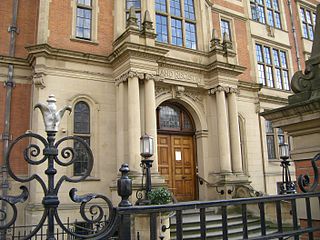Register or registration may refer to:

The Lord's Resistance Army insurgency is an ongoing guerrilla campaign waged by the Lord's Resistance Army (LRA) insurgent group since 1987. Currently, there is low-level LRA activity in the eastern Democratic Republic of the Congo and the Central African Republic. The movement is led by Joseph Kony, who proclaims himself the "spokesperson" of God and a spirit medium. The LRA's current aim is to overthrow Yoweri Museveni's Ugandan government and establish a theocratic state based on a version of the Ten Commandments and Acholi tradition.
An Airworthiness Directive is a notification to owners and operators of certified aircraft that a known safety deficiency with a particular model of aircraft, engine, avionics or other system exists and must be corrected.
His Majesty's Land Registry is a non-ministerial department of His Majesty's Government, created in 1862 to register the ownership of land and property in England and Wales. It reports to the Department for Levelling Up, Housing and Communities.

The Land Registration Act 2002 is an Act of the Parliament of the United Kingdom which repealed and replaced previous legislation governing land registration, in particular the Land Registration Act 1925, which governed an earlier, though similar, system. The Act, together with the Land Registration Rules, regulates the role and practice of HM Land Registry.
Land registration is any of various systems by which matters concerning ownership, possession, or other rights in land are formally recorded to provide evidence of title, facilitate transactions, and prevent unlawful disposal. The information recorded and the protection provided by land registration varies widely by jurisdiction.
The period from 2000 to 2006 of the Lord's Resistance Army insurgency in northern Uganda begins with the assault of the Uganda People's Defence Force (UPDF) upon LRA strongholds in South Sudan. This in turn led to a series of retaliatory attacks by the Lord's Resistance Army of an intensity not seen to since the mid-1990s. International awareness of the conflict gradually grew and in September 2005, the International Criminal Court issues warrants for the arrest of senior LRA commanders, including Joseph Kony.
Acra or ACRA may refer to:

The Land Registration Authority is an agency of the Philippine government attached to the Department of Justice responsible for issuing decrees of registration and certificates of title and register documents, patents and other land transaction for the benefit of landowners, agrarian reform-beneficiaries and the registering public in general; providing a secure, stable and trustworthy record of land ownership and recorded interests therein so as to promote social and economic well-being and contribute to the national development.

The Lord's Resistance Army (LRA) is a Christian extremist organization which operates in northern Uganda, South Sudan, the Central African Republic, and the Democratic Republic of the Congo. Its stated goals include establishment of multi-party democracy, ruling Uganda according to the Ten Commandments.

The International Standard Name Identifier (ISNI) is an identifier system for uniquely identifying the public identities of contributors to media content such as books, television programmes, and newspaper articles. Such an identifier consists of 16 digits. It can optionally be displayed as divided into four blocks.

J A Pye (Oxford) Ltd and Others v Graham and another [2002] is an English land law judgment from the final court of appeal at the time, the House of Lords, on adverse possession.
The government of the Soviet Union followed an unofficial policy of state atheism, aiming to gradually eliminate religious belief within its borders. While it never officially made religion illegal, the state nevertheless made great efforts to reduce the prevalence of religious belief within society. To this end, at various times in its history it engaged in anti-religious persecutions of varying intensity and methodology. Believers were never officially attacked for being believers, but they were officially attacked for real or perceived political opposition to the state and to its policies. These attacks, however, in the broader ideological context were ultimately meant to serve the ultimate goal of eliminating religion, and the perceived political opposition acted as a legal pretext to carry this out. Thus, although the Soviet Union was officially a secular state and guaranteed freedom of religion in its constitutions, in practice believers suffered discrimination and were widely attacked for promoting religion.

English land law is the law of real property in England and Wales. Because of its heavy historical and social significance, land is usually seen as the most important part of English property law. Ownership of land has its roots in the feudal system established by William the Conqueror after 1066, and with a gradually diminishing aristocratic presence, now sees a large number of owners playing in an active market for real estate.

The Land Registration Act 1925 (LRA) was an act of Parliament in the United Kingdom that codified, prioritised and extended the system of land registration in England and Wales. It has largely been repealed, and updated in the Land Registration Act 2002.
Link Lending Ltd v Bustard [2010] EWCA Civ 424 is an English land law case, concerning actual occupation in registered land and the vulnerable, in this case a defrauded person suffering from a mental syndrome who would have had little concept of what was occurring.
The Land Registration Act 1936 (LRA) was an Act of Parliament in the United Kingdom that amended the Land Registration Act 1925, concerning land registration in England and Wales. It has largely been repealed, and updated in the Land Registration Act 2002.

Registered land in English law accounts for around 88 per cent of the total land mass. Since 1925, English land law has required that proprietary interests in land be registered, except in cases where it is necessary to protect social or family interests that cannot reasonably be expected to be registered. English law also runs a parallel system for around 12 per cent of land that remains unregistered.








